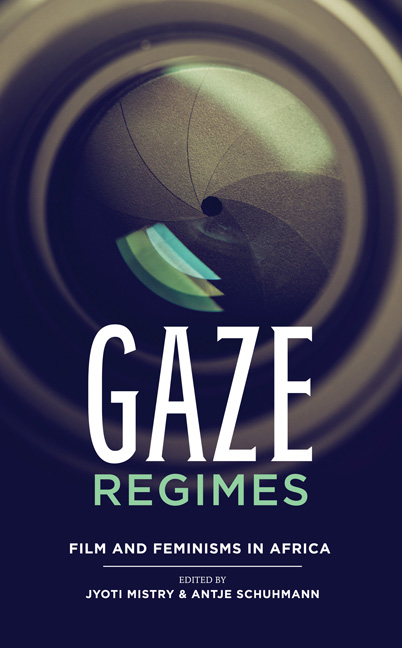Book contents
- Frontmatter
- Contents
- Acknowledgements
- Foreword: Goethe-Institut sub-Saharan Africa
- Introduction: By way of context and content
- 1 African Women in Cinema: An overview
- 2 ‘I am a feminist only in secret’
- 3 Staged Authenticity: Femininity in photography and film
- 4 ‘Power is in your own hands’: Why Jihan El-Tahri does not like movements
- 5 Aftermath – A focus on collective trauma
- 6 Shooting Violence and Trauma: Traversing visual and social topographies in Zanele Muholi's work
- 7 Puk Nini – A Filmic Instruction in Seduction: Exploring class and sexuality in gender relations
- 8 I am Saartjie Baartman
- 9 Filmmaking at the Margins of a Community: On co-producing Elelwani
- 10 On Collective Practice and Collected Reflections
- 11 ‘Cinema of resistance’
- 12 Dark and Personal
- 13 ‘Change? This might mean to shove a few men out’
- 14 Barakat! means Enough!
- 15 ‘Women, use the gaze to change reality’
- 16 Post-colonial Film Collaboration and Festival Politics
- 17 Tsitsi Dangarembga: A manifesto
- Acronyms and Abbreviations
- List of Contributors
- Filmography
- Index
16 - Post-colonial Film Collaboration and Festival Politics
Published online by Cambridge University Press: 20 April 2018
- Frontmatter
- Contents
- Acknowledgements
- Foreword: Goethe-Institut sub-Saharan Africa
- Introduction: By way of context and content
- 1 African Women in Cinema: An overview
- 2 ‘I am a feminist only in secret’
- 3 Staged Authenticity: Femininity in photography and film
- 4 ‘Power is in your own hands’: Why Jihan El-Tahri does not like movements
- 5 Aftermath – A focus on collective trauma
- 6 Shooting Violence and Trauma: Traversing visual and social topographies in Zanele Muholi's work
- 7 Puk Nini – A Filmic Instruction in Seduction: Exploring class and sexuality in gender relations
- 8 I am Saartjie Baartman
- 9 Filmmaking at the Margins of a Community: On co-producing Elelwani
- 10 On Collective Practice and Collected Reflections
- 11 ‘Cinema of resistance’
- 12 Dark and Personal
- 13 ‘Change? This might mean to shove a few men out’
- 14 Barakat! means Enough!
- 15 ‘Women, use the gaze to change reality’
- 16 Post-colonial Film Collaboration and Festival Politics
- 17 Tsitsi Dangarembga: A manifesto
- Acronyms and Abbreviations
- List of Contributors
- Filmography
- Index
Summary
As a filmmaker Dorothee Wenner has a particular interest in the -relationship of the West to non-European cultures. Since 1990 –she has also worked as programmer for the Berlin Film Festival/ Forum and has acted as the delegate for the regions of sub-Saharan Africa and India. Wenner is also a programme consultant for the Dubai Film Festival, and she has been a member of the board and of the jury of the Africa Movie Academy Awards (AMAA) since its inception. In her capacity as film festival programmer Wenner travels extensively across Africa and India to network, source new films and spot trends. She is an expert on the development of cinematic cultures and in this piece she reflects on her observations of the existing and emerging cinematic practices of women on the African continent. In a candid and refreshing multi-faceted approach to the variables that inform the curatorial choices, exhibition platforms and reception contexts that shape how content is determined, her insights reveal the push-pull factors that position African films in an international environment. She elaborates on these insights by describing the complex layers informing the production, circulation and eventual exhibition challenges that face African filmmakers. These challenges are about straddling the divides between the reception of their films by local audiences in their home territories and by audiences farther afield: on the African continent itself and within the international context of the festival circuit. Coupled with this is the persistent issue of the politics of representation of African cinema in Europe.
This contribution evolved as a result of conversations Dorothee Wenner and Antje Schuhmann had over three years, beginning when she shared some of her thoughts upon returning home to Berlin on the occasion of the AMAA awards in 2011 after one of her trips.
On a flight from Port Harcourt to Lagos I had the chance to chat with Hawa Essuman, the young co-director of Soul Boy (2010), a Kenyan film that had recently created quite a stir internationally and had been nominated in many categories at the AMAA in Nigeria. Hawa [Essuman] was ‘the chosen one’ who was invited to climb on the director's seat in ‘one-of-those’ Euro-African projects currently so much in vogue in various African countries. Internationally acclaimed German director Tom Tykwer was her mentor.
- Type
- Chapter
- Information
- Gaze RegimesFilm and feminisms in Africa, pp. 188 - 200Publisher: Wits University PressPrint publication year: 2015



